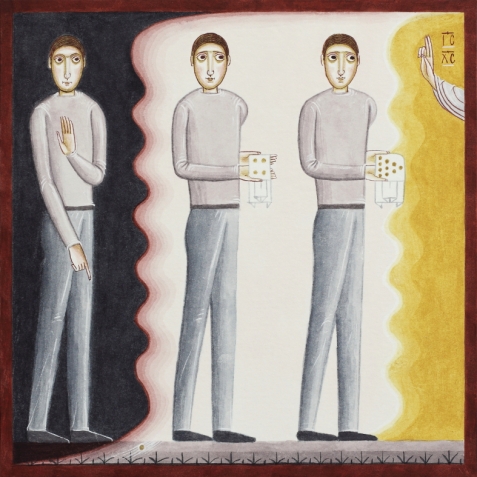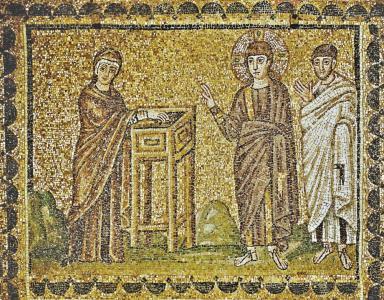
by the Serbian artist Nikola Sarić
The 400th anniversary of the KJV was earlier this month. There is no end to the influence which that magnificent achievement has had in the English world. It was that beautiful prose that formed Lincoln in his eloquence. It was often the only book in some homes, and the hearing and reading of it contributed phrases that still pepper speech today.
Today’s reading marks an instance where the KJV Bible gave an English word. Our word “talent” comes from this parable.1 The Greek word talanton in Jesus day was a measure of money. Originally a measure of weight, it came to be a measure of weight of gold or silver. Scholars tell us that a talent of silver was worth about 15 years of wages for a day laborer. In fact a talent was the largest monetary measure of the ancient world. It was used of the wealth of kingdoms and ancient Bill Gates or I suppose we could imagine the wealth of hedge fund investors. But because of this parable talent has come to mean also any God-given ability.
So you see the interpretation of this parable has shifted the meaning of this word.
Now some will say that this parable is really about the uncertainty of Christ’s return. All the parables in Matthew 25 tell us something about that. Some limit this parable to that because the idea of making money or having access to such wealth doesn’t seem to square with their idea Jesus’ followers were peasants and getting in too deep with large sums of money is dangerous spiritually. Jesus said, after all, that it is easier for a camel to make it through the eye of a needle than a person of means to get into the kingdom of God.
But in fact some of Jesus followers were not poor at all. Remember the expensive jar of nard poured on Jesus feet and the dinner Jesus was invited to at Zacchaeus’s home. And Matthew makes a point of including wise men with their impractical expensive gifts in the guest list for Jesus’s baby shower.
The parable is a gold mine of meanings. Let’s investigate what Jesus may be telling us today.
First, the workers got different talents. There is a difference in what we each have been given. That is true whether it is monetary or ability you are talking about. Is this a case of gross inequality? No, rather the master gives what he thinks each is able to handle. –“each according to his ability” (25:15) The master knows what they could do. The trust he gave was based on their ability. If they worked up to their ability there would have been an increase in every case. And in the end what they are judged by is what they have done with what they had. Their worth is based on the way they used the gift. On whether they worked up to their ability.
They accept what their master gives.
On our covenant renewal service for the last few years we have used words from a prayer of John Wesley.
Lord, I am no longer my own, but Yours. Put me to what You will, rank me with whom You will. Let be employed by You or laid aside for You, exalted for You or brought low by You. Let me have all things, let me have nothing, I freely and heartily yield all things to Your pleasure and disposal.
We don’t know why we were born in a free and rich country like America and not in a favela in Brazil or a refugee camp in Southern Sudan. We have not control over what we are given and we will not be judged by how much we have but by what we do with what we were given.
Second, All three of these servants are clear about the fact that what they are given is still the property of their master. Consistently through the parable the servants say “your money.” The master says “my money.” They are managing something that is on loan. It does not become theirs by their use of it.
Third, the most relevant difference between the servants is the what they do with what they were given. Both of the first two servants double what they have been entrusted. They are equal in the accomplishment because they both doubled the trust.
The third one does nothing with what he has been given.
Why do you suppose there is this contrast between the first two and the third?
For me the clue is the excuse the third one makes for not doing anything with the money he was given, “I knew that you were a harsh man, reaping where you did not sow, and gathering where you did not scatter seed; so I was afraid”
I think the first two saw their master as having confidence in them. The third man saw the master as critical, setting him up for failure, ready to condemn.
The first two focused on promise, the third focused on threat.
The first two focused on hopefulness; the third man focused on fearfulness
The first two acted; the third dallied.
The third servant thought he knew his master but he was wrong. He didn’t know and so he didn’t trust and so he did nothing and lost everything.
He was a servant in name only. He never did what the Master trusted him to do.
Do you think this might apply to us? What we do says something about what we believe. And if we never dare to do something significant with what the Lord has entrusted to us, one of two things might be true– we either think that was we have is simply ours and we can do or not do whatever we please with it. That is one mistaken belief! Or we can be paralyzed by fear that we might make a mistake and God would come down hard on us.
We have to take risks. Ann Lamott wrote, “Doubt is not the opposite of faith. The opposite of faith is certainty.”
He had ‘certainty’ that if he did anything wrong, he would be punished. And he let that certainty lead him into a fear And fear led to paralysis. “If I just tie this money in a handkerchief and bury it, that will be enough. I won’t have to do anything else. I can sit back, wait until the master returns and I won’t get in any trouble.”
“He who waits to do a great deed will never do any deed at all.” No risk, no reward. The third man played it safe and ended up losing everything. In the end, his talent went to the first man and he ended up with nothing. “Many people neglect the task that lies at hand and are content with having wished to do the impossible” (Teresa of Avila).
But here is the thing. What impresses me most is not the risk taking or failure of risk taking of the servants. I am impressed with the willingness of the master to risk such large sums of resource into the hands of servants.
Does this say something about our God?
A student in seminary had said, “Everything that God does is perfect”. Then the Candler theology professor commented, “I cannot support the contention that everything that God does is perfect. The biblical witness is not to a God who is perfect, but to a God who loves so much that God’s love overflows and takes risk.”
God loved enough to create the world and creation is not perfect. Note the presence of natural evil that surrounds us. God loved enough to create human community and human community is far from perfect. Note the presence of moral evil that surrounds us. God so loved the world that God sent Jesus that through him the world might be saved; but the life of Jesus did not go perfectly, at least not by any human standard and not all people are yet saved. God loved enough to risk. The courage to risk!2
God takes the risk because what God dreams of for us and for this world involves God’s great desire that we will add our own risks to his. God said to humans be fruitful. God said for us to steward creation.
“I knew you were a rough master– looking for return where you never invested.” But that is not the way it is. God is heavily invested in our becoming responsible, creative collaborators in making the world what it should be.
No. God “gives to all generously and ungrudgingly” (James 1:5)
God takes risks for our salvation and for the redeeming of the world. The cross is a testament to God not playing it safe.
And God wants us to join him in that.
It is not true what the third servant thought. The other two acted as if they were empowered by the master’s trust in them. They were repaid by his praise and rewarded with more responsibility.
Jesus told a parable once that if you were a servant and did what you were asked to do, what praise ought you to expect. All you had done was what it was your duty to do.
But this master does not take lightly the success of the two. He expresses delight and appreciation.
That is the picture Jesus draws of God.
Leslie Newbigin used to say there was something wrong in asking what God’s mission for the church is. God doesn’t have a mission for the church, he said. God has a church for his mission.
We exist, we are gifted, we are empowered and entrusted to participate in God’s work in the world. Bigger than the church.
God’s first assignment to humans was to be fruitful and to tend the earth. Out of that comes our commission to see justice prevail, the vulnerable protected, the young nurtured, the sinner brought home, the world repaired.
None of us has all that is needed. No church is up to the task alone. But each Christian, each family, each church and association can ask what it is that God has specially given them, and how those gifts might make a difference.
This means we have space to be creative. The master did not micro-manage. He did not give a list of specific things that had to be done with the capital he entrusted. He trusted each servant’s ability to dream and scheme, and set priorities, and weight the most effective strategies.
God may not have just one plan for how you use your gifts. Situations can change. Opportunities arise or door shut. But God trusts you.
I know how life transforming it is when you come to trust God with total commitment. But today’s gospel tells me how transforming it can be to realize God has trusted you. God waits to see what you will do with those gifts God has put in your hands.
Amen.
1M. Eugene Boring, Matthew, New Interpreters Bible Commentary vol. 8 (Nashville: Abingdon Press, 1995) 453.
2Jill Oglesby Evans, Emory Presbyterian
